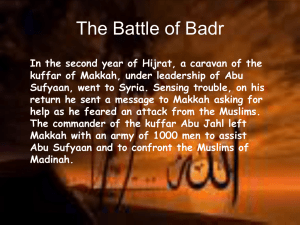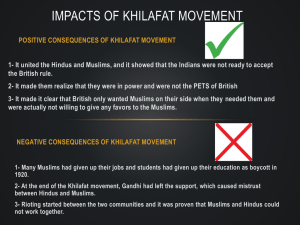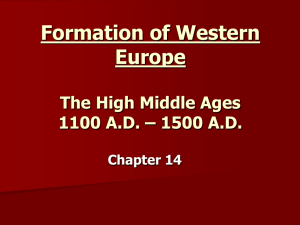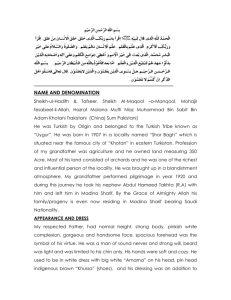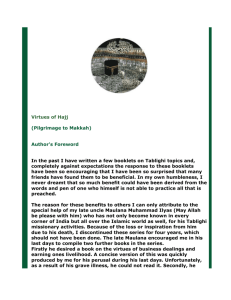Slide 1 - Al Fajr | Institute of Islamic Sciences
advertisement
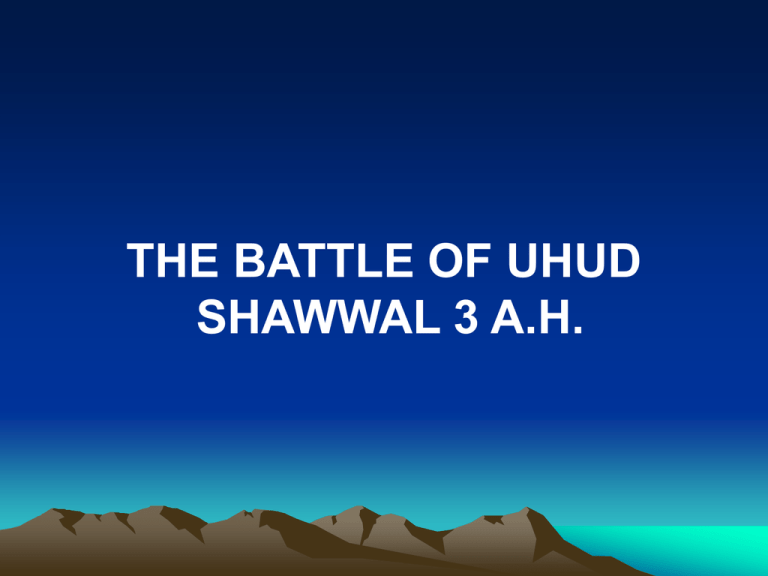
THE BATTLE OF UHUD SHAWWAL 3 A.H. The fire of vengeance was blindly burning in the hearts of the Makkans for they had met with a crushing defeat at Badr. In the third year of Hijrah they marched with 3,000 well armed solders towards Madinah. The kuffar of Makkah having lost their greatest leaders at Badr chose Abu Sufyaan as their commander. Rasulullah (s) made mushwarah (consultation) with the Muslims regarding the expected attack. It was finally decided to repel the attack outside the city of Madinah. Rasulullah offered Jum'a Salaat at Masjid-eNabwi and left for Uhud, a mountainous region 5 km north of Madinah with a thousand men on 14 Shawwal 3 A.H. Ubay the leader of the Munafiqs deserted the Muslims with 300 of his men, reducing the strength of the Muslim army to 700 men, poorly equipped in arms but filled with enthusiasm to defend the truth at all cost. Rasulullah (S) and the Muslims camped with the mountain behind them. On the one side there was a mountainous pass and there was danger of an attack from behind, so Rasulullah (S) posted 50 archers on Mount Rumat under the command of Hazrat Abdullah bin Jubair (R.A.) with strict orders not to leave the post at any account, irrespective of victory or defeat. •Hazrat Ali (R.A.) and Hazrat Hamza (R.A.) an uncle of Rasulullah (S) killed many of the kuffar. •Twelve flag bearers of the kuffar were killed, eight of whom were killed by Hazrat Ali (R.A.). •The kuffar were in desperate situation seeing their brave soldiers slain, they fled from the battlefield pursued by the Muslims. •When the archers saw the fallen flags of the enemy and their companions collecting the booty (spoils of war) they sensed victory, and in their enthusiasm and desire to participate in the pursuance of the enemy, the archers overlooked the command of Nabi (S) and left their positions. •Khalid bin Walid, a Makkan army general, did not fail to observe the weak position of the pass and saw his chance. Through the pass, at the head of his cavalry (soldiers on horseback) he fiercely attacked and the Muslims suffered heavy losses. •Hazrat Mus'ab bin Umair (R.A.), a sahabi who resembled our beloved Nabi (S) was martyred in this attack. The Kuffar soldiers raised a cry that the prophet (S) was slain. This alarming news spread like wild fire and caused great grief amongst the Muslims. •This false cry of the kuffar rallied the devoted Sahaba round Rasulullah (S). Hazrat Aus bin Nazar (R.A.) said: 'Oh what worth is life then if the Prophet (S) is no longer in our midst. Let us fight on for the cause which he fought for'. These words inspired the Muslims to fight for the cause of Islaam. Hazrat Ka'ab bin Malik (R.A.) saw Rasulullah (S) and loudly proclaimed; 'Muslims be happy, Rasulullah (S) is alive and well'. Thereafter Rasulullah (S) said, 'Come to me, I am the Rasool of Allah'. One of the enemy, Ibn Qami'ah moved forward and gave a blow with his sword over the head of Rasulullah (S) which caused two rings of his helmet (head gear) to pierce the face of Rasulullah (S). Another enemy struck him on the face with a stone with the result that two of his teeth fell Hazrat Hamza (R.A.) was martyred in this battle by Wahshi a negro slave. Jubair bin Mut'am the slave owner had offered Wahshi his freedom while Hinda binte Utbah, the wife of Abu Sufyaan, the commander of the Makkan army, offered her jewellery on her person if he, Wahshi succeeded in killing Hazrat Hamza (R.A.) The kuffar had to retreat because they were frustrated in their attempts against the Muslims. Before leaving the battlefield their passion and hatred and vengeance took the most barbarous shape, namely they gave vent to their vengeance on the dead bodies of the Muslims. The bodies were mercilessly mutilated. Hinda the wife of Abu Sufyaan hated the beloved uncle of Nabi (S) Hazrat Hamza (R.A.) and seeing his dead body, ripped it open, took out the liver, chewed it, and garlanded herself with the intestines. She climbed up a hill and sang a song indicating that the defeat at Badr was avenged that day, Sixty five Ansaar and four Muhajireen laid down their lives and achieved matchless martyrdom. Rasulullah (S) never lost his fortitude and patience. Yet again, the Kuffar left the battlefield having failed to exterminate Islaam.

